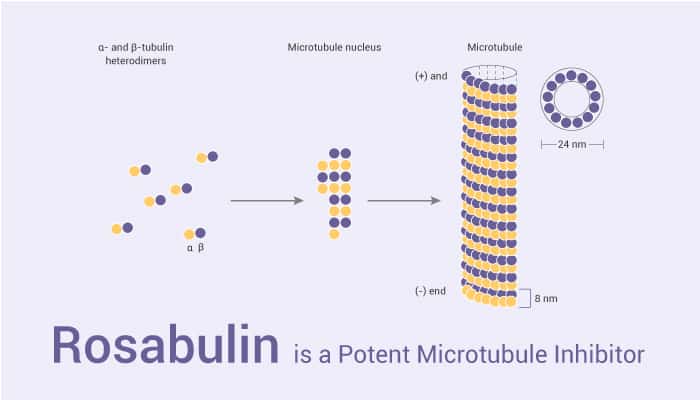Chemotherapy is a cornerstone in the development of present-day cancer therapy. Moreover, Chemotherapy is one of the most effective and potent strategies to treat malignant tumors. However, Chemotherapy resistance occurs when cancers that have been responding to therapy suddenly begin to grow. Rosabulin is a potent tubulin inhibitor. In particular, Rosabulin demonstrates the anti-cancer activity against chemotherapy-resistant cancers.

Rosabulin demonstrates substantial antiproliferative activity against a wide range of cancer cell lines in vitro, with IC50s extending down into the nanomolar range. Inhibition of microtubule assembly and subsequent arrest of the cell cycle is the mechanism of action for Rosabulin. Rosabulin is active against several tumor cell lines that express moderate to high levels of P-glycoprotein. Thus, Rosabulin is a potential new therapy for the treatment of cancer including chemoresistant tumors. Rosabulin (orally or intravenously) shows in vivo activity in several murine tumors as well as human tumor xenograft models, including drug-resistant tumors.
Rosabulin is a small molecule vascular disrupting agent. A vascular-targeting agent or vascular disrupting agent damages the vasculature (blood vessels) of cancer tumors causing central necrosis. Rosabulin binds to tubulin in a similar manner as colchicine and inhibits microtubule assembly. This results in the disruption of the cytoskeleton of tumor endothelial cells, ultimately leading to cell cycle arrest and blockage of cell division. Rosabulin induces a rapid shutdown and collapse of tumor blood vessels, leading to ischemia and consequent necrosis of the tumor mass.
In summary, Rosabulin is a potent microtubule inhibitor. Furthermore, Rosabulin offers several positive therapeutic attributes relative to the majority of cancer therapeutics.